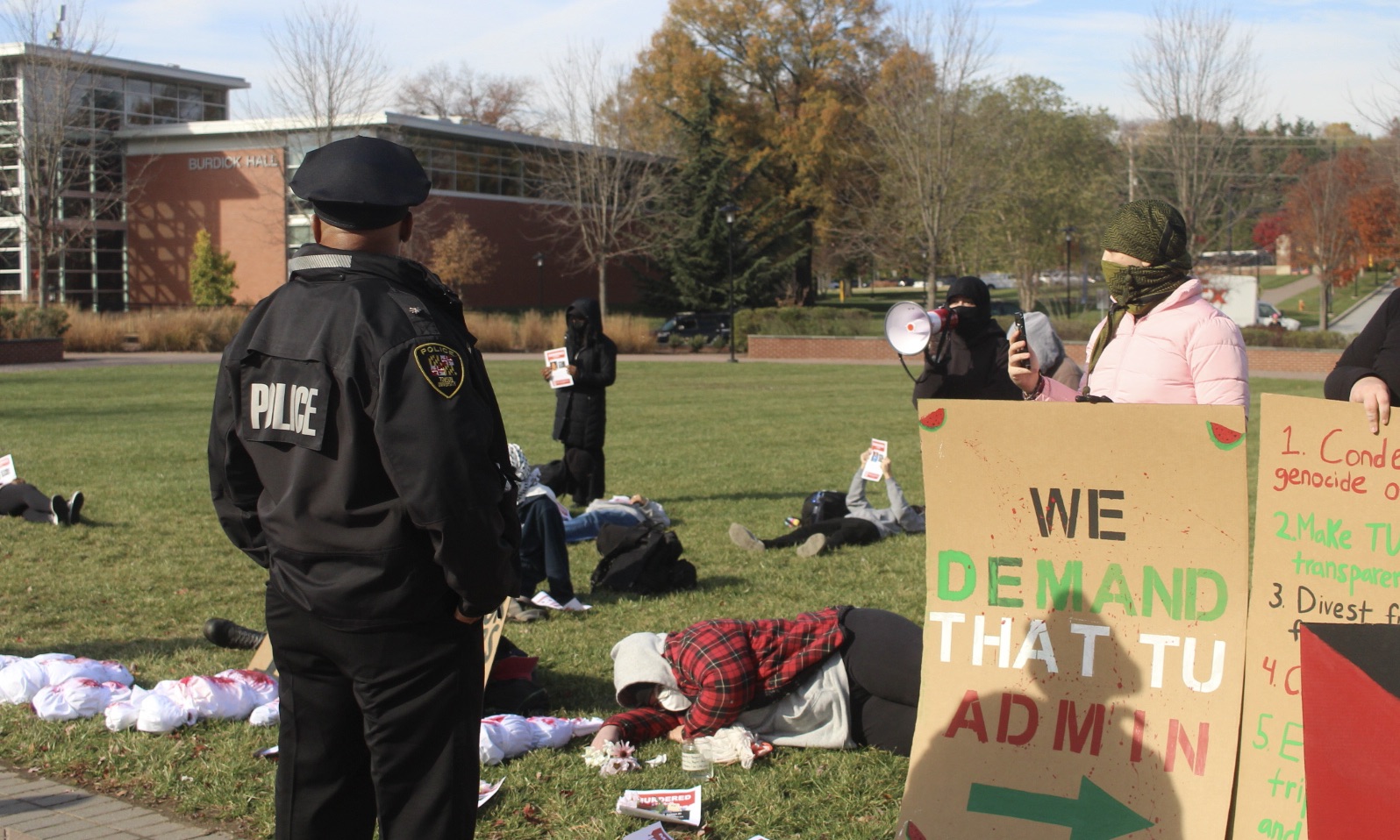
Participants in pro-Palestine protest face possible conduct violations
By Gabriel Donahue, editor-in-chief
Students who participated in an on-campus die-in supporting Palestine last month may have violated Towson University’s conduct code, according to emails from administrators obtained by The Towerlight.
Towson administrators accused the participants of violating the university’s time, place and manner policy, disrupting its operations, and failing to cooperate with university officials. Spontaneous protests are not permitted at Tiger Plaza, where the die-in was held Nov. 15, and students did not secure permission for the event.
This semester Towson’s campus has seen multiple demonstrations and protests organized by students in response to the reignited and deadly violence in the Middle East.
The students had protested by lying down on the Tiger Plaza lawn displaying 11 fake bodies to represent 11,000 Palestinians killed in Gaza since Oct. 7. That number has risen by almost 7,000 in the weeks since the demonstration, according to The Associated Press.
Participants also held signage demanding the university acknowledge and condemn the Israeli siege on Gaza, which some experts consider to be a genocide.
The Office of Student Accountability and Restorative Practices had investigated the incident and notified students of possible rule violations, Alison Peer, associate dean of students, said in an interview Tuesday.
Peer said the policy violation did not relate to the content of the demonstration.
“Demonstration of ideas is absolutely welcome within the confines of the policy,” she said. “Others have demonstrated within the policy.”
It’s unclear if all the participants are being punished.
One participant, who wished to remain anonymous for fear of being doxxed, said that Michael Youngborg, associate director of the conduct office, told the students that they likely faced probation or a deferred suspension.
Youngborg declined to comment Friday.
Deferred suspension allows students to remain on campus after committing an offense for which they could be suspended, Peer said in an email Sunday. Another rule violation would result in immediate suspension. Students under probation also face stronger consequences if they infringe on policy again, she said.
The participant said she believes the university is trying to keep it quiet by intentionally drawing the process out to the end of the semester while students are busy with finals before leaving campus for the six-week winter break.
She said she was told that a faculty member had identified her as a participant on Nov. 16, but that she didn’t receive a notice that she had violated the conduct code until eight business days later.
According to Peer, such notices are usually sent within two business days of the conduct office receiving reported violations. However, she said it was waiting on additional information from the investigation before notifying students.
“There was no intentional pushing back of the process, but it was us ensuring we’re doing our due diligence,” she said. “Whenever there are multiple people involved, it always elongates the process.”
Support for the students
The participants have since garnered some faculty support. As of Monday, 19 faculty members had signed a letter stating the demonstration did not disrupt university operations or teaching, which was delivered to President Mark Ginsberg, Provost Melanie Perreault and Vice President of Student Affairs Vernon Hurte.
Towson’s chapter of the American Association of University Professors will continue to circulate the letter, according to an email from one faculty member, who wished to remain anonymous out of fear of retaliation. The AAUP is one of the nation’s leading faculty groups.
“We do not believe that the University should try to circumscribe their right to free speech, nor do we find the punitive use of the student code of conduct helpful and productive in this case,” the letter reads.
Additionally, two alumni, Bilphena Yahwon and Breya Johnson, wrote to Perreault, demanding the students not be punished.
The two helped organize #OccupyTowson, a 2015 campaign that culminated with a sit-in at the president’s office that lasted almost nine hours.
Participants of #OccupyTowson did not face disciplinary action, nor did students who hosted a similar die-in inside the Albert S. Cook Library in 2014, the anonymous professor said.
Peer attributed the uneven enforcement of Towson’s time, place and manner policy to a different administration being in charge at the time. The policy, which has existed since 2010, has been updated six times since 2015.
The students have attracted other support online. A group under the name Baltimore Student Solidarity launched a call to action to “flood the Office of the President’s phone line” and demand the university not punish the students.
The group also created an email campaign on Action Network, a website that provides digital tools for political mobilization.
As of Tuesday evening, 186 emails were sent to Ginsberg and eight other administrators, according to the campaign website. More than 130 of those were sent upon its launch Monday.

